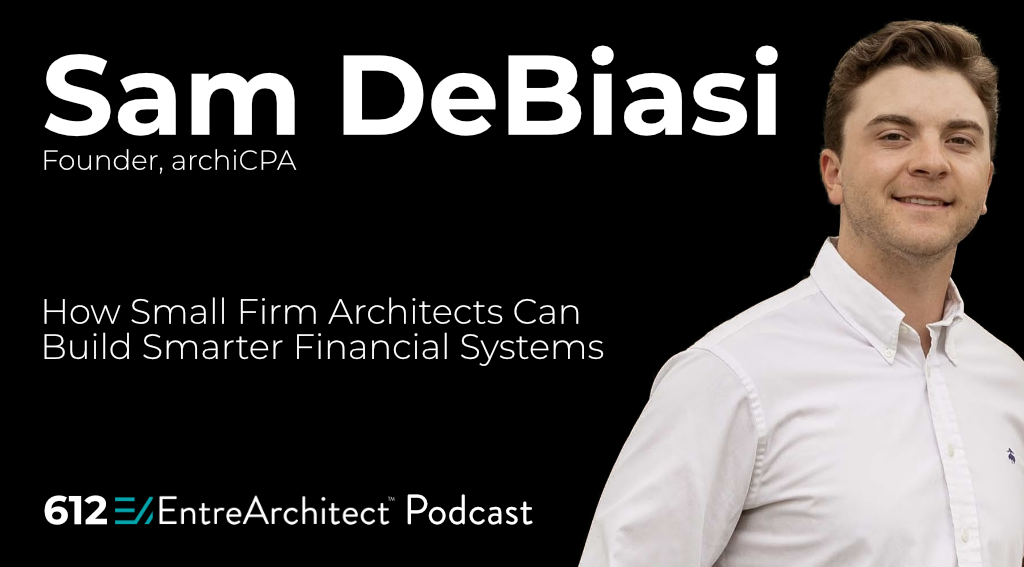
A Modern Approach to Managing Money, Metrics, and Mindset
There’s a common story I hear over and over again from small firm architects: “I didn’t become an architect to do accounting.” And yet, whether we like it or not, owning a firm means being responsible for the business—and that includes knowing your numbers.
In a recent conversation on the podcast, I sat down with Sam DeBiasi, a CPA who has worked with companies of all sizes, from Fortune 500 enterprises to one-person shops. What struck me most was not his résumé, but the way he framed the problem so many of us face: we’re making design decisions with the precision of a scalpel, but managing our businesses with a blindfold on.
Here are the seven biggest takeaways from our conversation—key insights to help you build smarter, more sustainable financial systems at your firm.
You can listen to the full conversation at https://entrearchitect.com/612.
1. What Isn’t Measured Can’t Be Managed
This idea came up again and again: If you aren’t tracking your financial metrics, you can’t expect to manage your business effectively. It’s a mindset shift. When you start thinking like a business owner—rather than just an architect—you begin to see your financial systems not as a burden, but as a tool to help you grow.
Whether it’s revenue, utilization rates, cash flow, or profitability, knowing the numbers is essential. It’s the only way to understand what’s working, what’s not, and where you need to improve.
2. Stop Doing Everything Yourself
One of the most common missteps small firm owners make is trying to handle all the financials themselves—especially at the beginning. And it’s understandable. You’re trying to save money, avoid overhead, and maintain control.
But the reality is that doing your books wrong can cost you more than doing them right. Whether it’s missed deductions, inaccurate reporting, or just the opportunity cost of your time—mistakes can be expensive. Delegating doesn’t mean losing control; it means freeing yourself up to focus on the work only you can do.
3. Tools Are Not Enough—Systems Matter
Many of us already use tools like QuickBooks, Factor AE, Gusto, or Factor. But those tools alone don’t create a system. It’s the way they’re integrated, customized, and used that makes them powerful.
Our conversation emphasized that piecemeal solutions—logging into three different platforms that don’t talk to each other—can lead to inefficiency, confusion, and errors. When your financial systems are fully connected and streamlined, you gain better insight, faster decision-making, and more confidence as a leader.
4. Growth Requires Infrastructure
As your firm grows, your financial systems need to evolve with you. A spreadsheet might be enough when you’re solo. But once you start adding team members, managing multiple projects, and scaling operations, you need systems that scale with you.
That includes things like payroll, time tracking, project management, forecasting, and regular financial reviews. The tools you start with might not be the tools you grow with—and recognizing when it’s time to upgrade is a sign of maturity as a firm owner.
5. Think Like a CEO, Not Just an Architect
This was the recurring theme throughout our talk: It’s not just about knowing how to use software. It’s about stepping into the role of business owner, with all the responsibility and opportunity that brings.
That means shifting your mindset from project-by-project thinking to long-term planning. It means measuring performance and profitability, not just productivity. It means building a practice—not just delivering a service.
And most of all, it means recognizing that your time is valuable. If you’re spending that time worrying about tax prep or trying to reconcile your books after hours, you’re not investing it where it matters most—building relationships, developing your firm, and creating architecture that matters.
6. Don’t Let Fear or Confusion Be the Barrier
We talked about how the fear of getting it wrong—or the overwhelm of where to start—often stops firm owners from taking action. Setting up proper financial systems, learning new tools, or even just scheduling a consultation can feel daunting.
But the cost of doing nothing is often higher. Confusion leads to poor decisions. Fear leads to missed opportunities. And procrastination leads to messier problems down the road.
If you’ve been putting this off, consider this your gentle push: take one step forward. Whether it’s switching to QuickBooks Online, setting up a time tracking system, or simply reviewing your expenses, action builds momentum.
7. Meet Yourself Where You Are, but Don’t Stay There
You don’t have to become a financial expert overnight. You don’t need to overhaul your entire system in a single weekend. But you do need to commit to progress.
Start where you are—whether that’s organizing your receipts or tracking project profitability—and build from there. Every firm is different, and every owner is on a different path. What matters is that you begin moving in the direction of clarity and confidence.
Because ultimately, financial systems aren’t about money—they’re about control, peace of mind, and the freedom to design the firm (and life) you really want.
Final Thought: Build for the Business You Want
One thing I’ve learned over the years is that the most successful architects I know didn’t just design great buildings—they designed great businesses. And that started with getting their financial house in order.
If you’re still doing everything yourself, operating on gut feeling, or letting your numbers intimidate you, I hope this conversation inspires you to make a change.
You became an architect to create meaningful work. With the right systems, you can do that—without the stress, the guesswork, or the late-night bookkeeping sessions.
Listen to the full episode at https://entrearchitect.com/612.
Leave a Reply